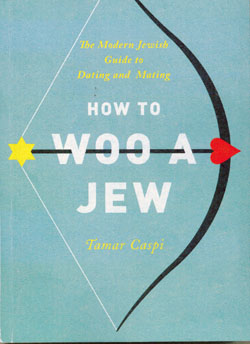Tamar Caspi, How to Woo a Jew: The Modern Jewish Guide to Dating and Mating, Seal Press, ©2014, 274 pages, 978-1-58005-500-0; $17.
By Donald H. Harrison

 SAN DIEGO—This book officially is scheduled for a February publication date, the same month that Nancy and I will celebrate 46 years of marriage, parenthood, and grand-parenthood. So what the heck am I doing reading about how to woo a Jew?
SAN DIEGO—This book officially is scheduled for a February publication date, the same month that Nancy and I will celebrate 46 years of marriage, parenthood, and grand-parenthood. So what the heck am I doing reading about how to woo a Jew?
The easiest answer to that question, is that our family has interacted with four generations of author Tamar Caspi’s family. I knew and covered her great-great uncle Joe Astor, when he was the executive director of the Jewish Community Center on 54th Street; and also covered her grandfather, M. Larry Lawrence, when he was the owner of the Hotel del Coronado and Southern California chairman of the Democratic party.
Tamar’s mother, Leslie Caspi, among a myriad of volunteer activities including chairing the local AIPAC chapter, was kind enough to lend her services as a copy-reader when Norman Greene and I were co-publishing the weekly San Diego Jewish Press-Heritage. Tamar, the book’s author, was the founding president of the Kovod Charter Elementary School, at which the Hebrew language is taught to my grandson Sky and other public school students. I haven’t yet met the fifth generation–Tamar’s two children, who are a preschooler and an infant—but I assume eventually our paths also will cross.
There was another reason that I wanted to read the book. Quite frankly, I was intrigued by the title. To paraphrase the Passover ritual, I couldn’t help but wonder, “Why is a Jewish single different from all other singles?”
While reading through a “bound galley, not for sale” (as reviewers sometimes do), I found myself wondering why Caspi aimed this book at the Jewish market, rather than at all those singles out there, Jewish and non-Jewish, who are looking for mates. Why did she choose such a limiting title, especially when easily 90 percent of the information in the book could apply equally to any single, Jewish or not?
It couldn’t have been just because she liked the sound of the rhyme between “Jew” and “woo.” Perhaps Caspi thought that Jewish singles constitute enough of an audience to guarantee the book’s success. Or perhaps she anticipates that there are a lot of non-Jews out there who will buy the book hoping to get some inside information on a group of people who make pretty good marriage partners?
Caspi will preview her book and perhaps answer some of these questions at 7 p.m. Thursday night, Jan. 23, at the Astor Judaica Library at the Lawrence Family JCC, 4126 Executive Drive, La Jolla
So what is unique in this book to Jews? Caspi advocates in favor of Jews dating other Jews, at least when they are thinking of settling down. Divorced herself, she knows that marriage can be hard enough for two people with common backgrounds, much less for people who come from very different cultures – not that she, nor I, thinks such marriages can’t work if the two partners are committed to each other.
Caspi offers optimal strategies for filling out the questionnaire on the J-Date site, for which Caspi is a regular blogger. She also offers clever ways, when meeting someone in a non-Jewish setting, to tease out whether that person is Jewish or not. For example, you might throw a few Yiddish or Hebrew phrases into the conversation and see if that person recognizes them or brow-crinkles in utter confusion. Or you might ask those potential dating partners whether they prayed that Sunday morning for their favorite football team to win. If the answer is yes, that person very likely wasn’t praying at the synagogue!
There is a chapter on Jewish mothers, which made me cringe a little because I thought Jewish mothers were portrayed a bit stereotypically, even if Caspi was warmly forgiving. I too have known mothers who have gone on line to arrange dates for their daughters, or who have researched the names of their daughter’s dates on Google, just to make sure that the prospective beaus were kosher, but there also are Jewish moms who are far more lay-back, figuring if there is someone who is her child’s beshert out there, daughter or son will find that person without any help from her.
Just as I threw in the words “or son” in the paragraph above, so that I was not just writing about daughters, so too does Caspi word her book in such a manner as to advise both female and male singles. Some of her case studies are about single men, some are about single women. But in reading the book, I sensed, overall, that it might be more on target for a female audience than for a male one. Don’t ask me why, just a feeling!
Among her case studies is a lesbian Jewish woman, whose dating travails read very much like those heterosexuals also go through.
I’m too old, and too far from the dating scene, to be able to say whether Caspi’s advice will help those who are of marriageable age to find their spouses, but I can testify that she is an excellent writer, and that the book is both easy and enjoyable to read.
*
Harrison is editor of San Diego Jewish World. He may be contacted at donald.harrison@sdjewishworld.com